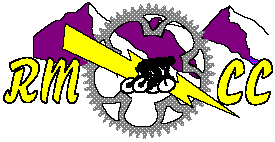
Rocky Mountain Cycling Club
Randonneurs USA

 |
Colorado Brevet
Series 2004 Rocky Mountain Cycling Club Randonneurs USA |  |
Colorado Brevet Series -- Rules and Info
|
Based upon ACP Rules as adopted
by RUSA.
Sanctioning
- Our
normal brevets are sanctioned by the Audax Club Parisien (ACP) in
Paris. The ACP has registered brevets since their inception in 1921. The
local (U.S.) sanctioning body for the ACP is Randonneurs
USA (RUSA), which is authorized by the ACP to organize brevets in
the U.S. Each cyclist's individual ride in a brevet is assigned a
certification number by the ACP -- this certifies your ride. Other
randonnées:
· Populaires are sanctioned by Randonneurs USA directly (not by the ACP). RUSA assigns the certification number. · Last Chance 1200km Randonnée is sanctioned by Les Randonneurs Mondiaux (RM) and RUSA (just as the normal brevets are RUSA/ACP sanctioned). The RM assigns the certification number. Who May Ride - These brevets are open to any adult (18 years and older) amateur cyclist, except for certain restrictions regarding professional racers. Allowable Vehicles for the Rider - Any form of human-powered vehicle is acceptable, as long as it is powered solely by the rider and is legal to be operated on the public thoroughfares used by the brevet route. Registration - To participate in a brevet, a rider must submit a registration form, sign a waiver of liability, and pay a registration fee (if any) set by the event organizer. Insurance - Each rider must be covered by liability insurance, either by a group policy or a personal policy -- in the case of the Colorado Brevets, this is achieved by being a member of the Rocky Mountain Cycling Club (REQUIRED). Rules of the Road - During the event, each rider is considered to be on a personal ride. The rider must ride in accordance with applicable traffic codes, obey traffic signals, and use bike paths when required by law. The ACP, RUSA, Rocky Mountain Cycling Club, and other brevet organizers cannot and do not accept responsibility for any accidents that may occur during the course of the brevet. Night Riding - For night riding, bicycles must be equipped with front and rear lights that conform to the local regulations (Colorado and, where applicable, other states) for bicycles. While riding, lights must be on from dusk to dawn and at any other times when poor visibility conditions exist (rain, fog, etc.). Each rider, whether riding in a group or alone, must use lights under these conditions. In addition, some combination of reflective vest, arm and/or ankle bands, or reflective strips on the bike is required. Light-colored clothing is also recommended for night riding. Any violation of these rules makes the rider subject to disqualification, whether en route or at inspection prior to departure. Support - No following vehicles or support of any kind, mobile or otherwise, are permitted on the course (except of course in an emergency situation). Personal support may be rendered only at checkpoints. Violation of the support rule subjects the rider to disqualification. Equipment - Helmets are required. Deportment - Riders are required to conduct themselves in a civil manner towards each other and towards the public, and respect local customs with regards to decorum. Route, Brevet Cards and Checkpoints - At the start, each rider will receive a brevet card and a cue sheet indicating the route and the location of the checkpoints. Riders must ride the entire route, unless authorized by the organizer because of special circumstances (road closures, etc.). If a rider leaves the route, the rider must return to the route at the same point prior to continuing. Organizers may also include unannounced (secret) checkpoints at any point along the route, to assure route integrity. Riders must stop at each checkpoint -- published or secret -- to have their brevet card stamped. Unstaffed Checkpoints - Organizers may include unstaffed checkpoints [that is, unstaffed by brevet officials -- this is the norm for Colorado Brevets]. At these checkpoints, riders must have their brevet cards stamped at some local establishment, such as a grocery store or gas station, as noted on the brevet card. Information must include the time (and date, for brevets that extend beyond 24 hours). For unstaffed
checkpoints where no means of getting a stamp is available (arrival in
the middle of the night, for example), the rider may mail in a postcard
(provided by the organizer) with the checkpoint information (time, date,
rider's full name) to the brevet organizer. In this case, the rider
should mark the brevet card in the space provided for the checkpoint
"PC" for Personal Checkpoint.
Alternatively, the brevet organizer may specify an
"informational checkpoint" where the rider is to note some
feature of the surroundings on the brevet card, along with the time. Checkpoint Variances - Missing checkpoint stamps, missing checkpoint times, or loss of the brevet card subjects the rider to possible disqualification. Note that each rider is responsible to assure that the brevet card is properly completed at each checkpoint. Time
Limits - Overall
time limits vary for each brevet according to the nominal distance (that
is, a "200km" brevet whose route comes out as 205km still has
the 200km time limit). These are (in hours and minutes):
Fraud and Cheating - Any fraud, cheating, or deliberate violation of these rules subjects the rider to exclusion from all RUSA, Randonneurs Mondiaux, and ACP-sanctioned events. Ride Finish - The rider must sign and return the brevet card to the event organizer. The brevet card will be returned to the rider after the brevet has been verified and a certificate number issued. In the event that the organizer loses a brevet card, no replacement to the rider will be made.Not a Race - These brevets are not races or other kind of competitive event. Riders should feel free to aim for goals of their choosing - within the rules - for example for fastest personal or overall time, but recognize that this is not the aim of these events, and that ungracious behavior against other riders can be grounds for disqualification. Drafting - Drafting is permitted. Riding cooperatively in groups and solo riding are equally encouraged. Above all, riders should keep their own goals and strengths in mind, as well as the constraints of meeting checkpoint times and the overall time limit. Results Reporting - A rider's results (events and certificate numbers) for RUSA/ACP brevets can be found on the Randonneurs USA website -- note that these are posted after certificate numbers have come back from the ACP. The results per brevet (riders and their finishing times) can be found on the RMCC / Colorado Brevets results page. Medals and Awards - Medals
and awards are available for individual brevets, and for completing
multiple brevets (further details at Randonneurs
USA):
- ACP
Super Randonneur status
is earned by completing 200km, 300km, 400km, and 600km brevets
in the same year. Order from RUSA (you must be a RUSA member). - RUSA
1000km, 2000km, 3000km, 4000km, and 5000km Medals -
RUSA offers 1000km, 2000km, 3000km, 4000km and 5000km medals for
riding those distances in RUSA-sanctioned events (including ACP-sanctioned
brevets in the US) in a single year. Order from RUSA (you must
be a RUSA member). RUSA
Membership - Membership
in Randonneurs USA is not required for
participating in Colorado or other RUSA-sanctioned brevets. However,
RUSA membership is strongly encouraged - the organization does a very
good job of providing randonneuring info to members, especially
preparing riders for the 1200km randonnées such as Paris-Brest-Paris or
Boston-Montréal-Boston, and certain benefits are available only to RUSA
members.
|